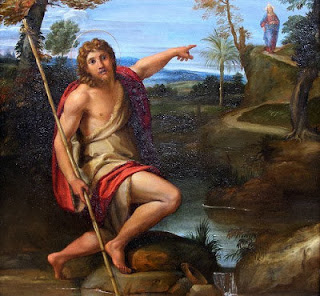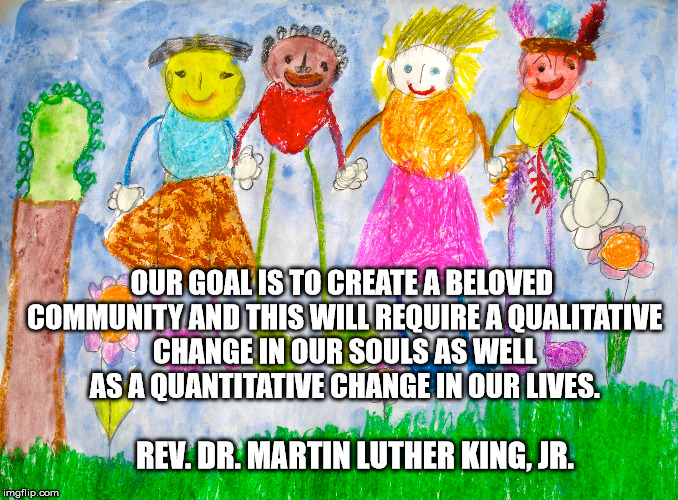Name-changer
John 1: 29-42
New Ark United Church of Christ, Newark, DE
January 15, 2017

How many of us knew, when our parents used our full first name, we were in big trouble? Whose parents used the middle name as well? I had an uncle who was called “Sunny” because he was the golden child. But when he was in big trouble, the words “Frederick James Keener Gilmore” put the fear of God into him. When our full name was used we wondered whether we might ever see the light of day again.
How
many of us have changed our last name?
Most people who change their names are women, although some men have
hyphenated names, have their partner’s last name as their middle name, or have
created a new last name that both partners share. Think what that means: mostly women, which means mostly half of the
population, have had to live into a new identity and to a degree, leave behind
the one that carried them into adulthood, from father’s name to husband’s name. Which means mostly the other less than half
of the population has not had to make this transition of identity in this
way. And yet in this 21st
century, if a man changes his name to his wife’s, it’s questioned, requires
explanation because it defies tradition.
But if we believe all are created equal, doesn’t it follow that our
actions align with our beliefs? And there
are other transitions of identity that most of us, but not all, can take for
granted: from child to adolescent to adult,
from student to a career or some form of employment, from single to married to
perhaps single again, from responsible for oneself to responsible to a partner
and/or to a child.
But
for most of recorded history it is a name that has power to shape and define
us. How many of us know what our names mean? Florence means prosperous, flourishing. Robert means bright fame and has been the name of Scottish and French
kings. Richard means brave power and has been the name of
three British kings. Gail is short for
Abigail which is Hebrew for “my father is joy”.
Edgar, comprised of Old English elements, means wealth, fortune, and spear,
while Donald from Gaelic and Old Celtic roots means ruler of the world. Angela
is the feminine form of the Latin angelus,
meaning “messenger”, while Christopher means “Christ-bearer”. John is derived from Hebrew, meaning “Yahweh
is gracious” (Jane or Jean is the feminine form), while Henry comes from the
German word for “home ruler”. Matthew is
the English form of a Hebrew name which means “gift of Yahweh”. Isabella is derived from the name Elizabeth,
which means “God is my oath”, while Barbara comes from the Latin for wild, free, untamed. Wendy comes from the Welsh name Gwendolen, a
mythical queen of the Britons, which means white
ring. Those are some pretty powerful
names.
In
this passage from the gospel of John we read all sorts of names and titles: Rabbi or teacher, Son of God, Messiah or Anointed. Jesus gives Simon Peter the name of Cephas,
which means Rock, but Peter was hardly that.
He could be both trusting and unsure, as when he stepped out of the boat
onto the water. He could be faithful and
open-hearted one minute and scared the next, as when he confessed Jesus as
Messiah but refused to believe that Jesus would be killed for it. Even as much as he loved Jesus, he also
denied that he knew him, let alone was one of his closest disciples. To top it off, Simon Peter was stubborn and hard-headed,
which may have been what Jesus was getting at.
Perhaps,
though, by giving Simon another name, Jesus was in a sense ordaining Peter to an
identity to live into, someone to become.
The name Jesus comes from Joshua or Yeshua, which means “Yahweh is
salvation”. Yahweh comes from the
Tetragrammaton, the unspeakable name of God—YHWH (Yod Heh Vav Heh)—which
means “I Am Who I Am” or “I Will Be What I Will Be”. To be or to become is salvation. We are saved by being who we are, embracing all
of who we are, and we are saved by
becoming who we will be.
 |
| Saint John the Baptist Bearing Witness, Annibale Carracci |
How about a name that has
the power to change lives? John the
Baptist, which is such a name, calls Jesus the Lamb of God. Wow, no pressure, Jesus, really. This name or title became part of the Latin
liturgy, the Agnus Dei, which is still said or sung at the breaking of the
host: Lamb of God, you take away the
sins of the world, have mercy on us.
Lamb of God, you take away the sins of the world, have mercy on us. Lamb of God, you take away the sins of the
world, grant us your peace.
However,
lambs were not sacrificed as sin offerings but used only for the Passover feast
as a reminder of when God liberated the children of Israel from slavery in
Egypt and delivered them from death. By
naming Jesus as Lamb of God at the beginning of John’s gospel we see a
foreshadowing of what is to come. Jesus
will liberate God’s people from slavery to sin and deliver them from death.
 |
| www.AgnusDay.org |
It
is only in John’s gospel that Jesus lives through three Passover feasts, three
years; just as in the liturgy, the Agnus Dei is repeated three times. However, I interpret it to also mean that
Jesus is the living Lamb of God, with
the power to change lives with his life
as much as with his death and resurrection.
When John says “Here is the Lamb of God who takes away the sin of the
world”, he’s not saying “Dead man walking”.
John testifies to a truth he knows to be true in the present tense. This is who Jesus is, as much as it is also
who Jesus will become.
We
too have been given names or titles that have the power to change human
lives. How about friend? Brother, sister, mother, father, daughter,
son, wife, husband, partner, grandparent, aunt, uncle, cousin: these plus love make us family. How about teacher? Volunteer, engineers of many stripes, entrepreneur,
small business owner, pilot, artist, poet, physicist, professor, lawyer,
author, writer, caregiver, nurse, doctor, emergency medical technician, firefighter,
peace officer, soldier. President, Vice
President, Senator, Representative, Justice, Speaker of the House, Secretary of
State, Attorney General. Citizen. Abraham, Martin, John, and Bobby, Dorothy,
Teresa, Harriet, Sojourner, Susan B., Barack, Michelle, Joe, Jill.
How
about New Ark United Church of Christ?
We are the New Ark: we don’t have
to enter two by two, it’s a safe haven for all, no matter who you are or where
you are on life’s journey, you are welcome here. We’re United Church of Christ, which means
we’re united and uniting, and we’re Church when we agree and when we
don’t. I think we’re united and Church
especially when we disagree because much of the world doesn’t know how to do
that and still be in covenant with one another.
We’re by no means good at it all the time either, we’re still learning,
but it’s something we can teach by practicing it every day. We are the Body of Christ in the world: the
hands, feet, mind and heart, eyes and ears and voice of Christ in a world that
hungers and thirsts for peace, justice, and wholeness.
How
about Christian? Disciple. Believer, Seeker, Agnostic, Atheist,
Questioner. All of us ministers. Faithful.
Wholehearted. Resilient. Forgiven.
Blessed.
We
took some time this past fall to look at who we are. So who are we? And who do we want to become? The answers we give to these questions will
hopefully surprise us, wake us up, enliven us, challenge us, heal us, give us
joy.

Amen.


Comments
Post a Comment